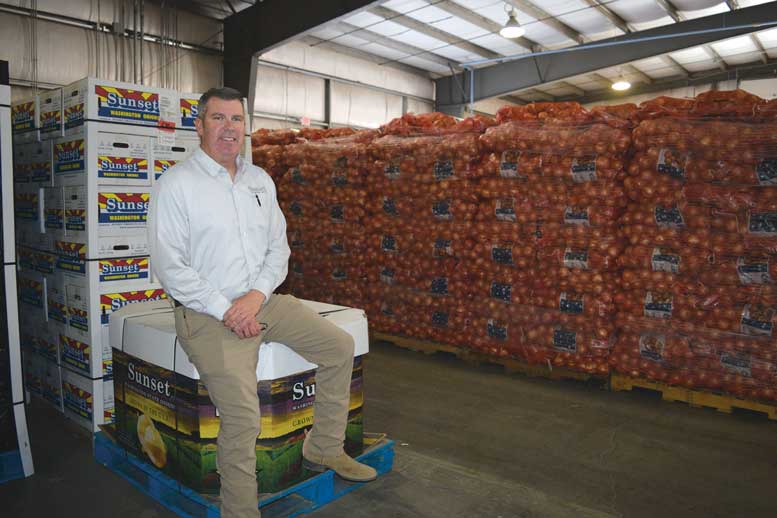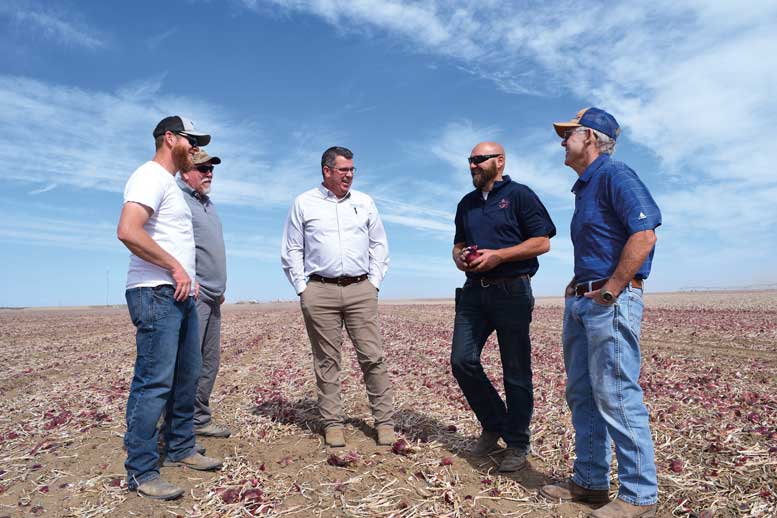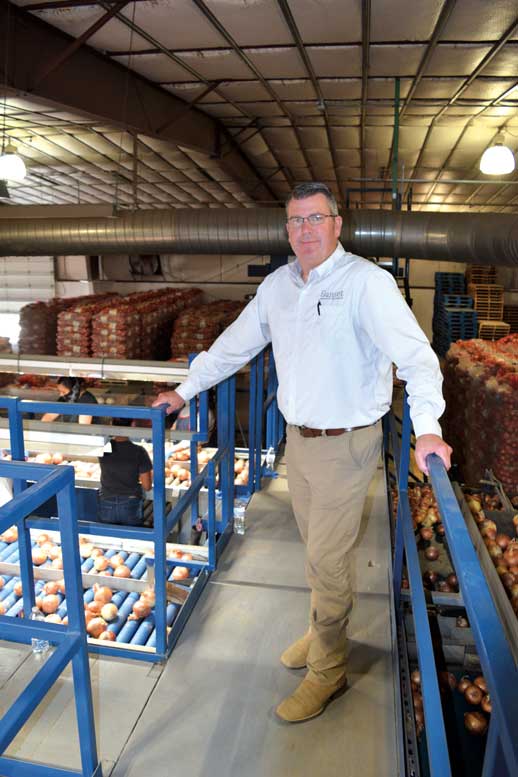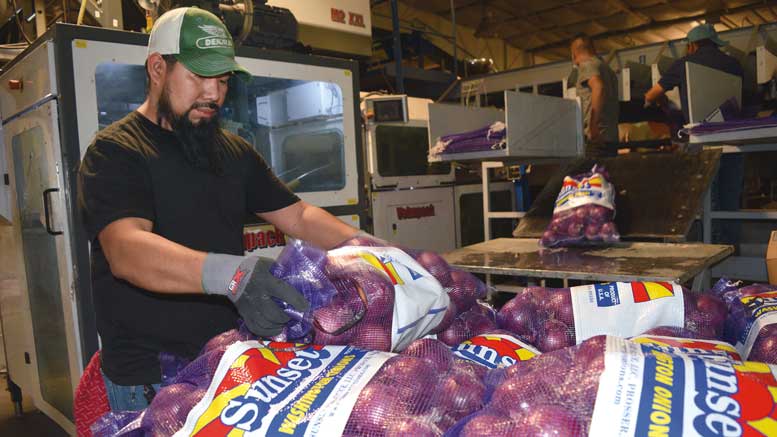|
Click to listen to this article
|
Story and photos by Denise Keller, Editor
When it comes to onions, timing is everything for owners and managers at Sunset Produce. From planting to packing, opportunistic timing and the ability to adapt when needed have been keys in the onion operation’s success.
Located in the Horse Heaven Hills near Prosser, Washington, Sunset Produce packs, sells and ships onions grown at R. Munn Farms and Duane Munn Farms. Brothers Robert and Duane Munn have been farming in the area since their dad, Lorin Munn, developed the land under irrigation in 1976. The family dabbled in onions, which they had previously grown in Oregon, but mainly grew potatoes in the farm’s early years. They began growing more onions in the 1980s, taking advantage of the region’s excellent soil, good water supply, and a climate well suited for onions.
Today, half of the Munn families’ onion acreage is planted in yellow onions, 30 percent in reds, and the balance in whites and sweet onions. Their rotation also includes carrots, sugar beets, grass seed, corn and wheat.

Adjusting as Needed
Built in 1989, Sunset Produce packs 5.5 million bags of onions a year and accounts for nearly 10 percent of the onions shipped in the U.S. daily when running at full speed. About 85 percent of the onions are sold throughout the U.S., 10 percent in Canada and Mexico, and 5 percent exported to the Pacific Rim.
Sunset Produce general manager Brenden Kent attributes much of the company’s growth to a hands-on style of management within a vertically integrated business model.
“What’s unique about us is we are very large, but what’s nice is our sales staff is all on site,” Kent says. “We are in the fields. We know what’s going on with the product because we’re out in the plant. I know a lot of our customers really appreciate that.”
For example, Kent will change Sunset’s packing schedule based on sales throughout the day. Knowing what’s selling, what’s being packed and what’s in the field or in storage, he tries to make customer-driven management decisions.
“We’re not afraid to change when change is needed. For a big operation, that can be hard. I think the fact that we’re family owned and there’s no politics allows us to change quickly and make the necessary changes faster than other big operations can,” Kent says.

Saving on Staffing
Sunset Produce has made several changes in the last few years in response to the increasing cost of labor. While the availability of labor has improved, Kent says, the cost of labor remains an especially big concern for employers in Washington state. Minimum wage just increased to $16.28, and agricultural employers are no longer exempt from paying overtime wages.
To stay competitive, Sunset Produce adjusted hours of operation at the packing shed in 2023 by running the plant four days a week instead of five and adding a night shift. This change meant hiring more employees, but allowed the amount of overtime to be reduced. The new schedule has also increased the plant’s efficiency, improved the ability to maintain equipment and increased employee satisfaction, according to Kent.
Sunset has been utilizing a night crew on its consumer bag line for three years. In 2022, the company automated the consumer lines in order to further streamline the operation and save on labor costs. In addition, the packing shed includes an optical grader on its six-lane sizer, and Kent is looking into adding more electronic grading equipment in the future.
In the field, the Munns were hand-topping early-harvested white onions up until a couple of years ago. With the associated labor costs approaching $2,000 per acre, the growers hired Lee Shuknecht and Sons to custom build a harvester with a double topping table. The machine can lift, top and harvest onions while the tops are green, allowing the growers to harvest early and take advantage of a window in the market. And by eliminating the cost of hand-topping the onions, the harvester paid for itself in about two years, according to the growers.

Farming as Family
While the Munn family grows the onions and Kent is tasked with getting them to market, they all agree on what it takes to produce a product worthy of the Sunset label.
“Farming is more of an art than it is a science,” Duane Munn says. “Farming is all about timing.”
Kent agrees that having the experience to properly time farming practices from planting to irrigation to harvest helps produce the level of quality Sunset Produce customers expect.
“If you want to be in this business, that’s the whole thing. If you have good quality and you have your timing figured out and you know how to market it, you can do well and you can grow. But if you don’t have those things figured out, it can hurt; it can really diminish your growth potential and hold you back,” Kent says.
Although Sunset Produce’s competition includes both large family farms and corporate farms, Kent believes family farms run by working managers like the Munns will always have an edge over the competition.
“I think family farms have a very solid future in the onion industry because onions are very hard to produce, they’re hard to pack, and sometimes they’re hard to sell,” Kent says. “A corporate farm that has a corporate farm manager, in my opinion, is going to have a hard time growing as good of a crop as a family-trained farmer that has interest and skin in the game growing onions.”
A passion for farming and the knowledge to do it successfully are being passed down from one generation to the next in the Munn family. Duane’s son, Shane, is now largely responsible for the day-to-day operation of Duane Munn Farms, and Shane’s son, now in high school, plans to farm in the future. Robert Munn’s three sons, Randy, Ryan and Rob Jr., manage R. Munn Farms and each of them have sons who are involved or plan to be involved with the farm, representing the fourth generation and counting.

